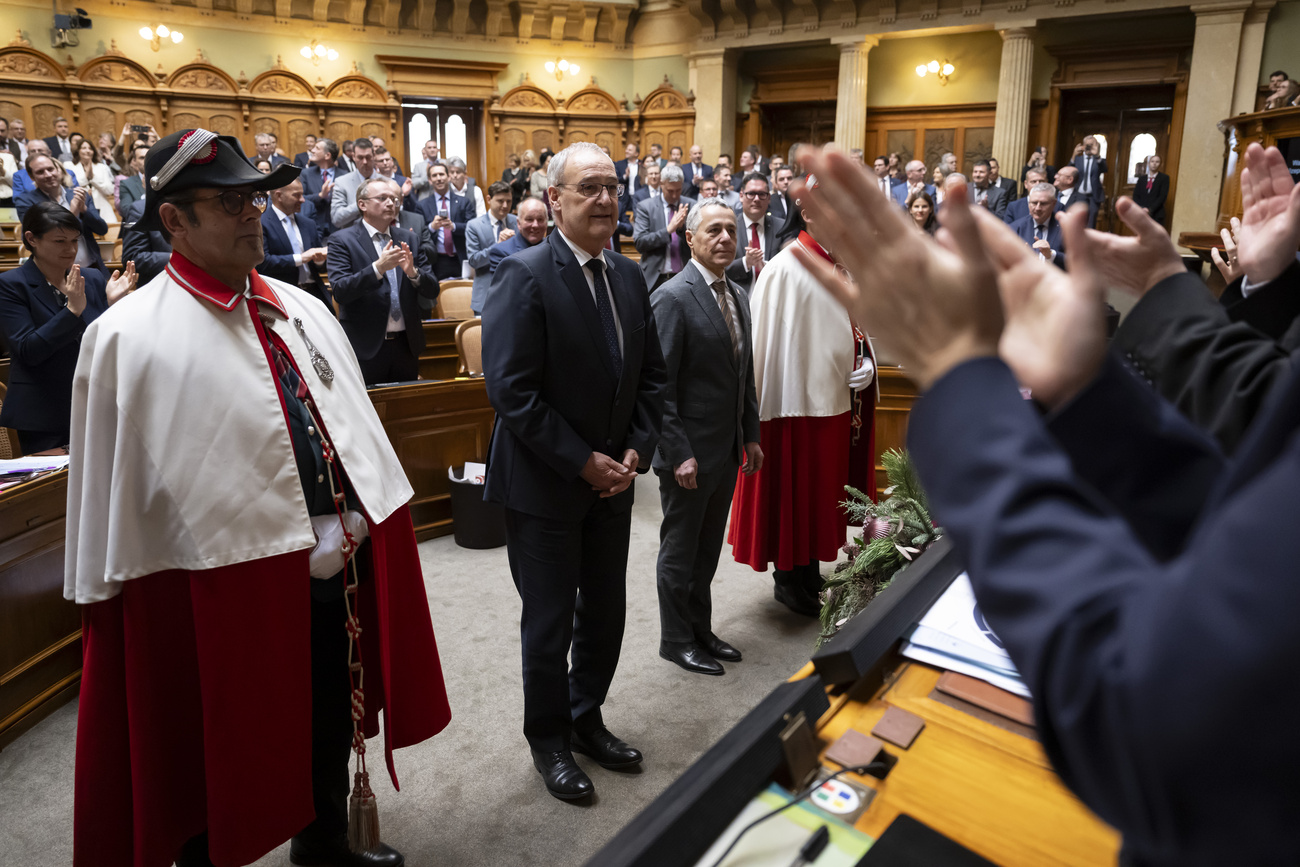
Where democracy springs eternal

What future for the "Landsgemeinde" – the unique Swiss institution of an open-air assembly in which citizens take key political decisions by raising their hands?
swissinfo visited Glarus, a mountain region in eastern Switzerland, where the 700-year tradition is very much alive and continues to draw the crowds.
Even the most unsuspecting visitor could tell that something was going on. On the eve of the Landsgemeinde earlier this month, hundreds of people were selling their wares or looking for a bargain in the town’s flea market.
Overnight, professionals took over the stalls, which now offer anything from souvenirs, clothes and books to a vast selection of food, including sapsago, the local goat cheese.
A brass band plays in the morning sun; soldiers stand guard outside the town hall. Some people are in their Sunday best, others are even wearing traditional costume.
The day is a social occasion for the whole region. For Denise Marx and her husband Nick, the Landsgemeinde is an excellent way to get young people interested in politics. The couple are on their way to pick up their children from the crèche and enjoy the special atmosphere.
Direct democracy
Some have travelled from far away to witness the unique gathering at the foot of the Glärnisch mountain. Peter Neumann, director of the Institute for Direct Democracy in Dresden, has come from Germany with his students.
Neumann is impressed by Switzerland’s two remaining Landsgemeinden in Appenzell and Glarus. The principle of voting by a show of hands is the same in both, but each has distinct local features.
“But most of all you see direct democracy in action,” Neumann said. “It’s an awe-inspiring event for us. You can see that people take it seriously and show respect for their fellow citizens by listening to what the various speakers in the open-air assembly have to say.”
It’s a view shared by Fritz Schiesser, a member of Glarus parliament and senator for his canton in the federal parliament.
Schiesser grew up aware of the Landsgemeinde’s importance, which goes beyond that of a political decision-making body.
For him the highlight is when citizens taking part in the annual assembly are asked to raise their arms and swear an oath to abide by the law and pledge allegiance to the state.
Limits
Schiesser is conscious of the restraints of an open-air assembly where every citizen can speak out and put forward their own ideas. Or where votes are not accurately counted but majority decisions are based on estimates – even if it takes three times to come to a conclusion.
Despite the shortcomings, the future of the Landsgemeinde is secure, according to Silvano Möckli, professor at the Institute for Political Science in St Gallen.
“The Landsgemeinde is a very special trademark and key to the cohesion of society, especially in a rural or remote region. It is crucial to safeguard things that distinguish your community from the rest in a globalised world.”
Möckli has also suggested introducing a secret ballot at open-air assemblies by using modern electronic voting technology.
But even without it, the chances of finding many voices advocating the abolition of the Landsgemeinde are slim.
Surprise
As the meeting in the ring draws to a close, the 6,000 participants leave the square. They have just thrown out a government plan to reduce the number of local authorities from 25 to ten.
But, to general surprise, they went for a far more radical proposal and set it at just three.
Many people sitting in the open-air cafés play down the impact of the landmark vote – or perhaps its significance has not quite hit home.
Others admit the Landsgemeinde landed a bit of a coup. “The young participants made the difference, I think,” said town guide August Berlinger. “It goes to show that the Landsgemeinde is alive and has a good chance of surviving.”
It makes you wonder whether the result is also proof of what Berlinger described as a certain stubbornness of his fellow citizens who often feel misunderstood by the rest of Switzerland.
swissinfo, Urs Geiser
The Landsgemeinde (open-air assembly) is the highest political decision-making body in the canton.
Its origins are believed to date back some 1,500 years, and such gatherings were known primarily in Alpine regions in what is today Switzerland, northern Italy, Austria, as well in the Pyrenees, central and northern France and in northern Germany.
Only the assemblies in Switzerland survived after the Middle Ages.
Of the eight Swiss cantons with a Landsgemeinde, only Glarus and Appenzell Inner Rhodes keep the tradition alive. The others abandoned the gatherings over the course of the past 150 years.
85% of Switzerland’s more than 2,700 communes have regular citizen gatherings indoors throughout the year to decide on local matters.
Glarus is a mountain region tucked away between Zurich and eastern Switzerland. It was a major manufacturing centre in the 19th century.
About 25,000 people have the right to vote in canton Glarus. Women got the vote in 1971.
On average up to 7,000 citizens take part in an open-air assembly, traditionally held on the first Sunday in May.
The only other Swiss canton with an annual open-air assembly is Appenzell Inner Rhodes, where women only got the vote in 1991 after the federal court intervened.

In compliance with the JTI standards
More: SWI swissinfo.ch certified by the Journalism Trust Initiative
































You can find an overview of ongoing debates with our journalists here . Please join us!
If you want to start a conversation about a topic raised in this article or want to report factual errors, email us at english@swissinfo.ch.